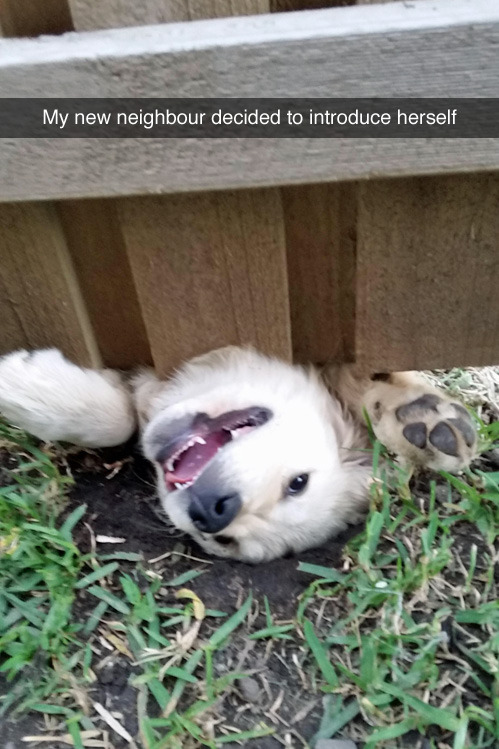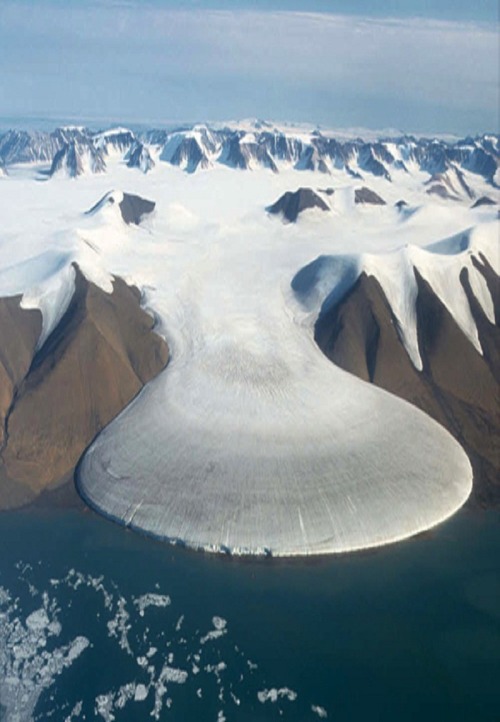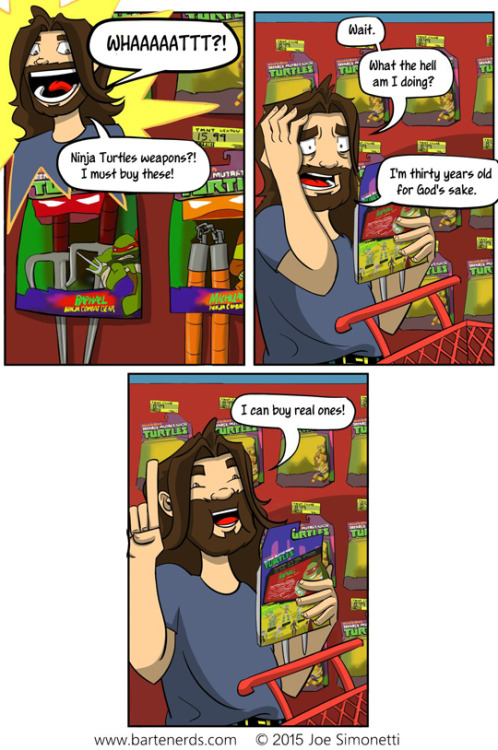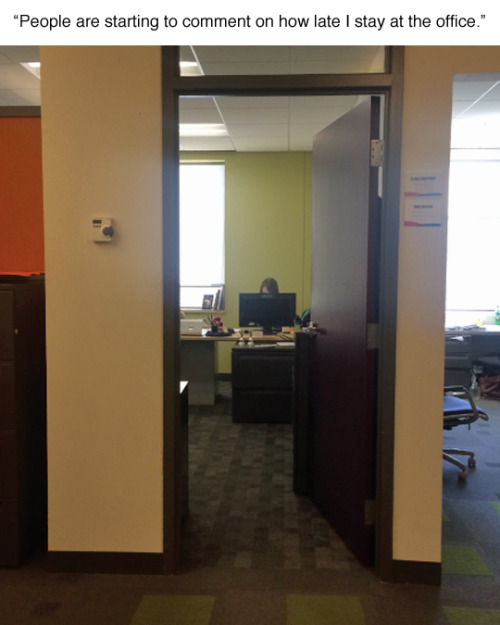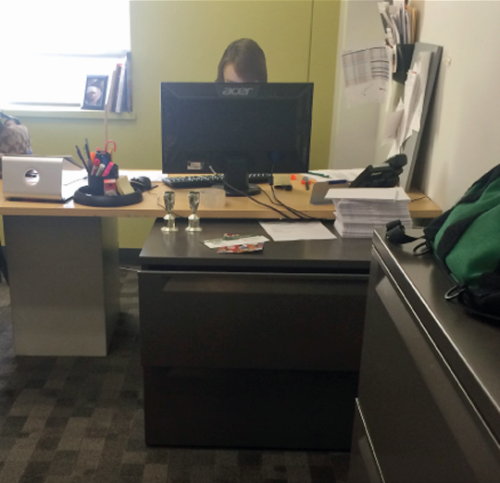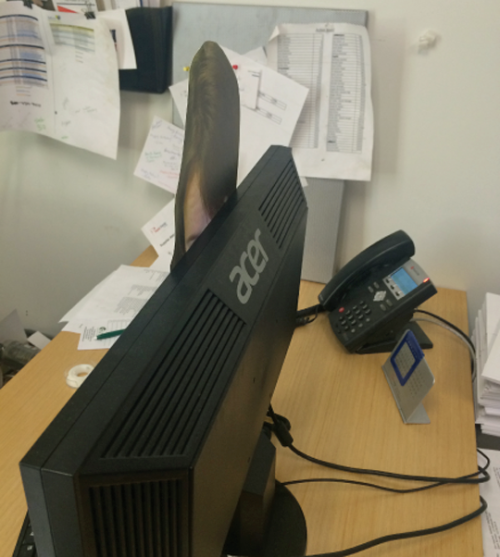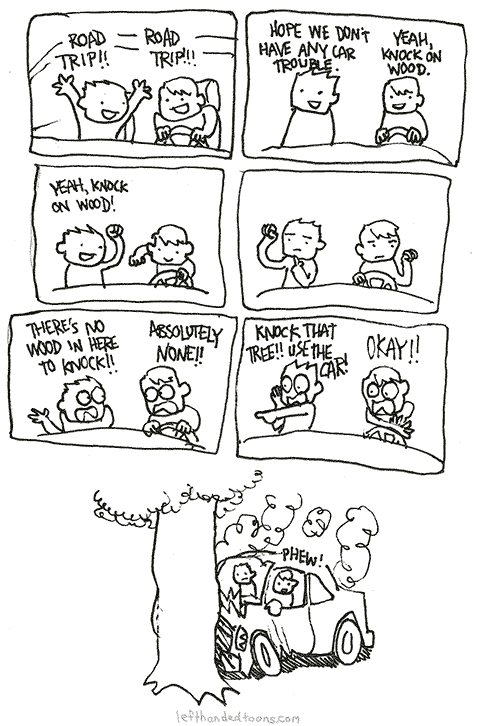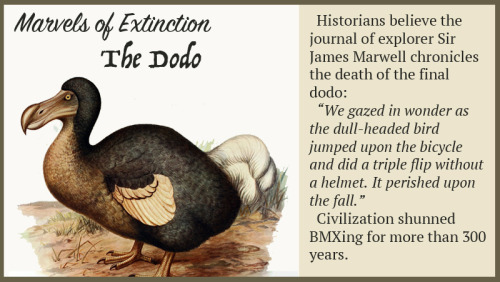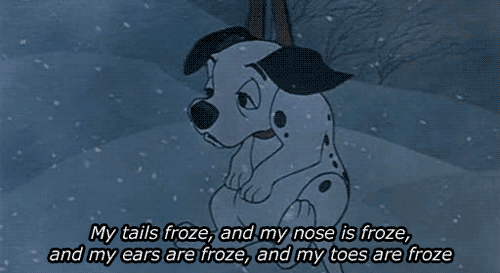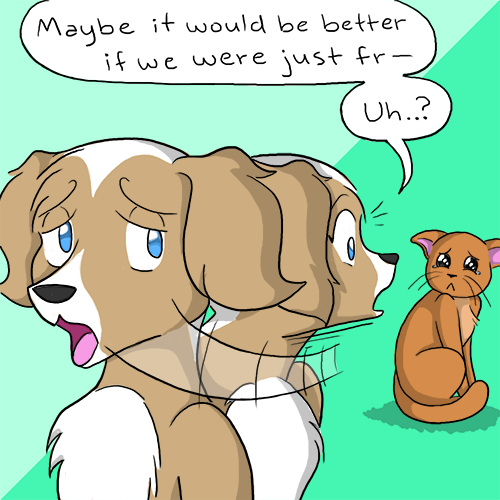What more is there to say beyond the title? I won't let that stop me, though. We're standing in a more easily weathered and eroded set of sedimentary beds, deposited between two massive Columbia River Basalt flows. Those two flows, in turn, of Grande Rhonde Basalt, originated in what is now northeastern-most Oregon, and flowed all the way across the state, and even continued past this area, to reach the location of the modern Pacific shore. Anyone who says science spoils natural beauty is an idiot. Natural beauty is what drew me to geology, and a major factor in why I continue to pursue it. So now, not only am I awed by nature's glory, I'm amazed by how it happened, too.
Incidentally, if you look at the left upper edge of the leading photo, you see a thin, nearly horizontal notch. If we zoom to full resolution (The crop below is about 2/3 scale; right-click and open in new tab to see full size.), you can see there's a fence in that notch... that's the path from the parking area as it heads into the cove behind the falls. And when I scaled the photo up to make a crop to show the fence, I realized there's a person for scale, just to the right of the falls.
Photo unmodified. August 30, 2012. FlashEarth Location (approximate).
Miscellaneous thoughts on politics, people, math, science and other cool (if sometimes frustrating) stuff from somewhere near my favorite coffee shop.
Saturday, January 17, 2015
Geo 1095: January 16, Day 746: Another Negative Stump
This tree cast needs scale, but it's too high, maybe 10 or 12 feet above the path, to get at. I'd guess it's in the range of 1-2 feet in its long dimension. As I said in the previous "negative stumps" post, these casts are smaller and less densely distributed than the modern forests in the immediate vicinity, but remind me more of the oak-savannah copses on the modern Willamette Valley floor. (Silver Falls is well up into the Cascade Foothills, and gets significantly more precipitation than lower down.) Unfortunately, unless one was to find some preserved charcoal, there's no way to determine what taxon of tree this represents, at least that I know of. On the other hand, given even a small bit of charcoal, I could easily determine in a glance whether it was a softwood or a hardwood, and the genus Quercus (oaks) is fairly easy to recognize from its wood grain- though taking it to the species level is tricky for experts and impossible for me.
Photo unmodified. August 30, 2012. FlashEarth Location (approximate).
Photo unmodified. August 30, 2012. FlashEarth Location (approximate).
Thursday, January 15, 2015
Geo 1095: January 15, Day 745: Physical Geology Graffiti
I saw that the Led Zepplin album alluded to in the title is being remastered for its 40th(!?) anniversary, so a shout-out is due.
Between the graffiti, lichens, and irregular jointing, I have a difficult time being certain I'm seeing what I think I'm seeing in this layer of sediment at the back of the cove at North Falls. It looks as if the cross bedding indicates bi-directional flow: sometimes right-to-left, others, left-to-right. This might indicate an intertidal environment, though the layers look a little too thick for individual tidal events. Alternatively, it might indicate migrating channels, with overflow deposits coming from different directions at different times. However, as with much in this blog, I'm just guessing from a decent, but limited, knowledge and experience base. Any feedback or further insights would be appreciated. Also (and I know the people who need to see this won't), please don't deface things in parks... you have no idea how much they might mean to others. This one *really* pissed me off.
Photo unmodified. August 30, 2012. FlashEarth Location (approximate).
Between the graffiti, lichens, and irregular jointing, I have a difficult time being certain I'm seeing what I think I'm seeing in this layer of sediment at the back of the cove at North Falls. It looks as if the cross bedding indicates bi-directional flow: sometimes right-to-left, others, left-to-right. This might indicate an intertidal environment, though the layers look a little too thick for individual tidal events. Alternatively, it might indicate migrating channels, with overflow deposits coming from different directions at different times. However, as with much in this blog, I'm just guessing from a decent, but limited, knowledge and experience base. Any feedback or further insights would be appreciated. Also (and I know the people who need to see this won't), please don't deface things in parks... you have no idea how much they might mean to others. This one *really* pissed me off.
Photo unmodified. August 30, 2012. FlashEarth Location (approximate).
Wednesday, January 14, 2015
Geo 1095: January 14, Day 744: Sedimentary Interbeds
This is a marginally useful view of the sedimentary rocks between the two large Grand Ronde Columbia River Basalt flows. The lens cap is 52 mm in diameter (2 inches, for practical purposes), but that's a little misleading, because the darker rocks just above it are back a good deal farther than the rocks it's resting on, and the uppermost light layer, as well as the rock below it, are closer to the camera. So the sense of scale is likely at least a little misleading. Next, the jumbled-looking rock the cap is resting on could easily be taken for some kind of breccia. As best as I can recall, though, it's just more horizontally bedded sediment. But it's weathered, and quite a bit of talus has spalled off onto that slope, basically obscuring and confusing what it is we're looking at.
On the other hand (and the reason I decided to post this photo), it does appear to show distinct compositional zoning between layers. If I was being forced to guess as to the reason, I'd conjecture that the lighter layers represent sporadic felsic and ashy Cascade eruptions, and the darker layers represent times when the major sediment source was erosion of exposed CRB surfaces upstream from here. But I'm not being forced to guess, so I won't.
Photo unmodified. August 30, 2012. FlashEarth Location (approximate).
On the other hand (and the reason I decided to post this photo), it does appear to show distinct compositional zoning between layers. If I was being forced to guess as to the reason, I'd conjecture that the lighter layers represent sporadic felsic and ashy Cascade eruptions, and the darker layers represent times when the major sediment source was erosion of exposed CRB surfaces upstream from here. But I'm not being forced to guess, so I won't.
Photo unmodified. August 30, 2012. FlashEarth Location (approximate).
Tuesday, January 13, 2015
Geo 1095: January 13, Day 743: Negative Stumps
Standing under North Silver Falls and looking up at the ceiling provides a glimpse of a helluva way to die. We're looking up chimney-like tubes that were once tree trunks. Those trees were growing on what I take to be a nearly flat alluvial plain, developed atop the previous Columbia River Basalt flow, which is visible as the sloping bedrock (not the loose boulders, which fell off the overhanging ledge) in this photo. Judging by the number and size of these casts, the trees were not as large, nor the forest as dense, in this location as during modern times. It may have been more like the modern valley floor, with the more sparse oak-savannah style of vegetation, but I'm speculating on that. Then the next CRB flow came along and drowned the trees in fire. I feel bad for them, but I'm awfully glad they left such nice fossils.
Incidentally, this was taken at approximately the same location as the other people were standing in yesterday's photo.
Photo unmodified. August 30, 2012. FlashEarth Location (approximate).
Incidentally, this was taken at approximately the same location as the other people were standing in yesterday's photo.
Photo unmodified. August 30, 2012. FlashEarth Location (approximate).
Monday, January 12, 2015
Geo 1095: January 12, Day 742: Close to the Ledge, Under the Water
Here we are under- yes, under- North Falls. In the right center, note the tiny little figures of hikers who were traveling the opposite direction from us. As you can see, "relatively thin," I phrase I actually had to consider carefully when I chose it yesterday, does not necessarily mean "thin." Those dark beds are about four or five feet thick. Even though we can't see the waterfall in this shot, I think it almost does justice to the incredible sense of soaring space this overhang gives me. I hadn't been to this particular spot in 15-20 years, and I had forgotten how much it awes me.
Photo unmodified. August 30, 2012. FlashEarth Location (approximate).
Photo unmodified. August 30, 2012. FlashEarth Location (approximate).
Sunday, January 11, 2015
Geo 1095: January 11, Day 741: Falls and Fronds
Another shot of North Falls, which I really like for the way the fern fronds mimic the form of the waterfall. Once again, you can see the relatively thin dark layer of sediment that is the weak zone in this stack of rocks. As I discussed in an old post, the "hard over soft" arrangement of rock layers is, to my mind, the "classic" set-up for a waterfall.
Photo unmodified. August 30, 2012. FlashEarth Location (approximate).
Photo unmodified. August 30, 2012. FlashEarth Location (approximate).
Sunday Funnies: Billy Skywalker/Anakin Joel Edition
"Amazing. Billy Joel playing harmonica looks just like dying Anakin Sywalker." Warren Christmas
What Would Jack Do?
Tastefully Offensive
"The final resting place of the USS Enterprise" What Would Jack Do?
You only want to eat 70% of it. Bad Newspaper
Fetch: Not even once. Via Pleated Jeans, from Reddit
This one took me a moment; one rarely sees mash-ups of Classic mythology and superheroes. Funny to Me
Phil Jones
Sober in a Nightclub
Sober in a Nightclub
Tastefully Offensive
Pleated Jeans
Joe Simonetti/Bartenerds
Tastefully Offensive
Sober in a Nightclub
Very Demotivational
Funny to Me
Maximumble
Superstitions are bad luck. Left Handed Toons
Sober in a Nightclub
Cheezburger
Darius Whiteplume
Tastefully Offensive
Spud Comics
Blackadder
The Far Left Side
Very Demotivational
Fake Science; four other "Marvels of Extinction at the link.
Rock Paper Cynic
Bad Newspaper
Tom Toles
Modern warfare. Sober in a Nightclub
Bad Newspaper
Very Demotivational
Wintertime geology field trips. (recaptioned from) What Should We Call Grad School?
"When I'm asked a difficult question after my talk." What Should We Call Grad School?
"The Academy Award for Best Costuming Goes To..." Bird and Moon/David Orr
New Yorker/Joe Dator
Sober in a Nightclub
Jim Benton
Very Demotivational
Cat fight in 5, 4, 3, 2.... Senor Gif
Tastefully Offensive
The Guardian
This Modern World
"Spotted in Canton, MI." Tastefully Offensive
Bizarro
The Gentleman's Armchair
"Mmm... pi." Tastefully Offensive
What Would Jack Do?
Tastefully Offensive
"The final resting place of the USS Enterprise" What Would Jack Do?
You only want to eat 70% of it. Bad Newspaper
Fetch: Not even once. Via Pleated Jeans, from Reddit
This one took me a moment; one rarely sees mash-ups of Classic mythology and superheroes. Funny to Me
Phil Jones
Sober in a Nightclub
Sober in a Nightclub
Tastefully Offensive
Pleated Jeans
Joe Simonetti/Bartenerds
Tastefully Offensive
Sober in a Nightclub
Very Demotivational
Funny to Me
Maximumble
Superstitions are bad luck. Left Handed Toons
Sober in a Nightclub
Cheezburger
Darius Whiteplume
Tastefully Offensive
Spud Comics
Blackadder
The Far Left Side
Very Demotivational
Fake Science; four other "Marvels of Extinction at the link.
Rock Paper Cynic
Bad Newspaper
Tom Toles
Modern warfare. Sober in a Nightclub
Bad Newspaper
Very Demotivational
Wintertime geology field trips. (recaptioned from) What Should We Call Grad School?
"When I'm asked a difficult question after my talk." What Should We Call Grad School?
"The Academy Award for Best Costuming Goes To..." Bird and Moon/David Orr
New Yorker/Joe Dator
Sober in a Nightclub
Jim Benton
Very Demotivational
Cat fight in 5, 4, 3, 2.... Senor Gif
Tastefully Offensive
The Guardian
This Modern World
"Spotted in Canton, MI." Tastefully Offensive
Bizarro
The Gentleman's Armchair
"Mmm... pi." Tastefully Offensive










